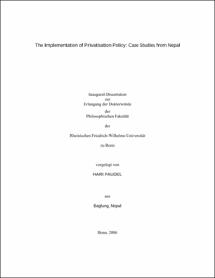The Implementation of Privatisation PolicyCase Studies from Nepal

The Implementation of Privatisation Policy
Case Studies from Nepal

| dc.contributor.advisor | Evers, Hans-Dieter | |
| dc.contributor.author | Paudel, Hari | |
| dc.date.accessioned | 2020-04-08T12:22:15Z | |
| dc.date.available | 2020-04-08T12:22:15Z | |
| dc.date.issued | 2006 | |
| dc.identifier.uri | https://hdl.handle.net/20.500.11811/2457 | |
| dc.description.abstract | This dissertation deals with the implementation process of privatisation policy in Nepal. The main objective of the study was to explore the implementation process of privatisation efforts, to identify the problems that have been met in the process of privatisation and to identify the prospects of privatisation policy for a developing country such as Nepal. Inline with the objectives the main research assumption was the policy has been implemented due to the internal and external factors to achieve some stated goals but due to some implementation barriers, they have not been achieved as expected. The theory of policy implementation, the concept of privatisation and strategic group analysis has been chosen for the analysis of data - to compare and contrast the Nepal’s situation. The main findings show that due to the deteriorating conditions of the PEs and the ideological shift of the new government with the advice and suggestions of the international donor community, the government formulated and implemented the privatisation policy in Nepal. There were different actors/strategic groups who contributed to formulate and implement the policy. They were policy elites including the Prime Minister, the Finance Minister, the Vice-Chairman of the National Planning Commission, high ranking government officials, the members of parliament, the business community and the donor agencies. However, some of the strategic groups such as employees of the privatised enterprises and trade union representatives were against the privatisation. The main objectives of the policy have not been met in Nepal due to some implementation barriers. Despite explicit opposition from the political parties regarding policy content as such, the problems of implementation were more closely related to the process of implementation and other factors, such as evaluation of the enterprise, selection of bidders, political instability, lack of developed capital market, lack of investors and poor conditions of public enterprises. Although the overall impact of privatisation in Nepal is not very promising, it is necessary for the overall development of the country, as the government cannot continue to run such loss-making enterprises in the age of globalisation and liberalisation, nevertheless it should be implemented in a cautious and selective manner. | en |
| dc.language.iso | eng | |
| dc.rights | In Copyright | |
| dc.rights.uri | http://rightsstatements.org/vocab/InC/1.0/ | |
| dc.subject | impact | |
| dc.subject | performance | |
| dc.subject | policy formulation | |
| dc.subject | policy implementation | |
| dc.subject | privatisation | |
| dc.subject | public enterprises (PEs) | |
| dc.subject | interactive model | |
| dc.subject.ddc | 300 Sozialwissenschaften, Soziologie, Anthropologie | |
| dc.title | The Implementation of Privatisation Policy | |
| dc.title.alternative | Case Studies from Nepal | |
| dc.type | Dissertation oder Habilitation | |
| dc.publisher.name | Universitäts- und Landesbibliothek Bonn | |
| dc.publisher.location | Bonn | |
| dc.rights.accessRights | openAccess | |
| dc.identifier.urn | https://nbn-resolving.org/urn:nbn:de:hbz:5-07245 | |
| ulbbn.pubtype | Erstveröffentlichung | |
| ulbbnediss.affiliation.name | Rheinische Friedrich-Wilhelms-Universität Bonn | |
| ulbbnediss.affiliation.location | Bonn | |
| ulbbnediss.thesis.level | Dissertation | |
| ulbbnediss.dissID | 724 | |
| ulbbnediss.date.accepted | 22.12.2005 | |
| ulbbnediss.fakultaet | Philosophische Fakultät | |
| dc.contributor.coReferee | Gerke, Solvay |
Dateien zu dieser Ressource
Das Dokument erscheint in:
-
E-Dissertationen (712)




